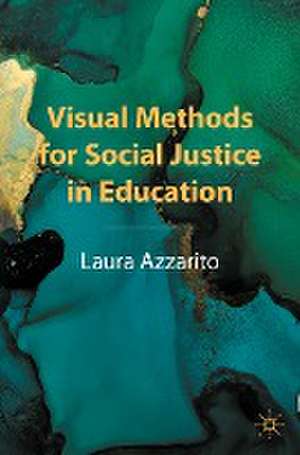Visual Methods for Social Justice in Education
Autor Laura Azzaritoen Limba Engleză Paperback – 3 mai 2023
Preț: 318.52 lei
Nou
Puncte Express: 478
Preț estimativ în valută:
60.95€ • 63.81$ • 50.43£
60.95€ • 63.81$ • 50.43£
Carte disponibilă
Livrare economică 17-31 martie
Livrare express 28 februarie-06 martie pentru 27.19 lei
Preluare comenzi: 021 569.72.76
Specificații
ISBN-13: 9783031257445
ISBN-10: 3031257448
Pagini: 176
Ilustrații: X, 176 p. 31 illus.
Dimensiuni: 155 x 235 x 13 mm
Greutate: 0.27 kg
Ediția:1st ed. 2023
Editura: Springer International Publishing
Colecția Palgrave Macmillan
Locul publicării:Cham, Switzerland
ISBN-10: 3031257448
Pagini: 176
Ilustrații: X, 176 p. 31 illus.
Dimensiuni: 155 x 235 x 13 mm
Greutate: 0.27 kg
Ediția:1st ed. 2023
Editura: Springer International Publishing
Colecția Palgrave Macmillan
Locul publicării:Cham, Switzerland
Cuprins
Chapter 1. Visual Research from a Social Justice Research Paradigm in the Neoliberal Era.- Chapter 2. Intersectionality, Counternarratives, and Counter-visualities.- Chapter 3. Photo-elicitation to Amplify and Elevate Research Participant Voices.- Chapter 4. Participatory Visual Research for Community Empowerment and Social Change: Photovoice, Photodiary, Photojournalism, and Photonovela.- Chapter 5. Children as "Artists": Drawing to Express Social Justice.- CHAPTER 6. Visual Ethnography: Depicting Landscapes for Social Change.- Chapter 7. Visual Ethics: Dilemmas, Judgement, and Ethics of Care.- Chapter 8. The Power of Arts-Based Inquiry & Exhibitions for Social Change.- Chapter 9. Conclusion.
Notă biografică
Laura Azzarito is Professor of Physical Culture and Education and Co-Director of the Visual Research Center for Education, Art, & Social Change (VRC) at Teachers College, Columbia University, USA. Her scholarly work is situated at the intersection of socio-educational and critical theory and practice, and uses creative visual methodologies to explore youth embodiment with a focus on the intersectionality of gender/sex, social class, race, (dis)ability from constructivist, CRT, postcolonial, post-feminist, and trans theories.
Textul de pe ultima copertă
This book makes a case for the usefulness of visual research methods for advancing a social justice agenda in education. The author aims to provide education researchers with a wide range of qualitative visual research tools to invoke different stories, voices, embodiments, and experiences of individuals from marginalized communities; to advance emancipatory research projects; to embrace interdisciplinary knowledge-building; and to counter-narrate Western forms of knowledge, cultures, and values for the reimagining of education for social change. It draws attention to the importance of visual methods in today’s neoliberal landscape of education to speak back to mainstream research and practices, especially when research participants lack words to describe, express, and represent what it means to be impacted by oppression and marginalization.
Laura Azzarito is Professor of Physical Culture and Education and Co-Director of the Visual Research Center for Education, Art, & Social Change (VRC) at Teachers College, Columbia University, USA. Her scholarly work is situated at the intersection of socio-educational and critical theory and practice, and uses creative visual methodologies to explore youth embodiment with a focus on the intersectionality of gender/sex, social class, race, (dis)ability from constructivist, CRT, postcolonial, post-feminist, and trans theories.
Laura Azzarito is Professor of Physical Culture and Education and Co-Director of the Visual Research Center for Education, Art, & Social Change (VRC) at Teachers College, Columbia University, USA. Her scholarly work is situated at the intersection of socio-educational and critical theory and practice, and uses creative visual methodologies to explore youth embodiment with a focus on the intersectionality of gender/sex, social class, race, (dis)ability from constructivist, CRT, postcolonial, post-feminist, and trans theories.
Caracteristici
Moves from traditional words-driven qualitative research to visual research and visual methods for social justice Informed by contemporary critical theories Critical Race Theory (CRT), intersectionality, postcolonialism, post-feminism Challenges normativities often attached to conventional research methods in the context of neoliberal globalization
